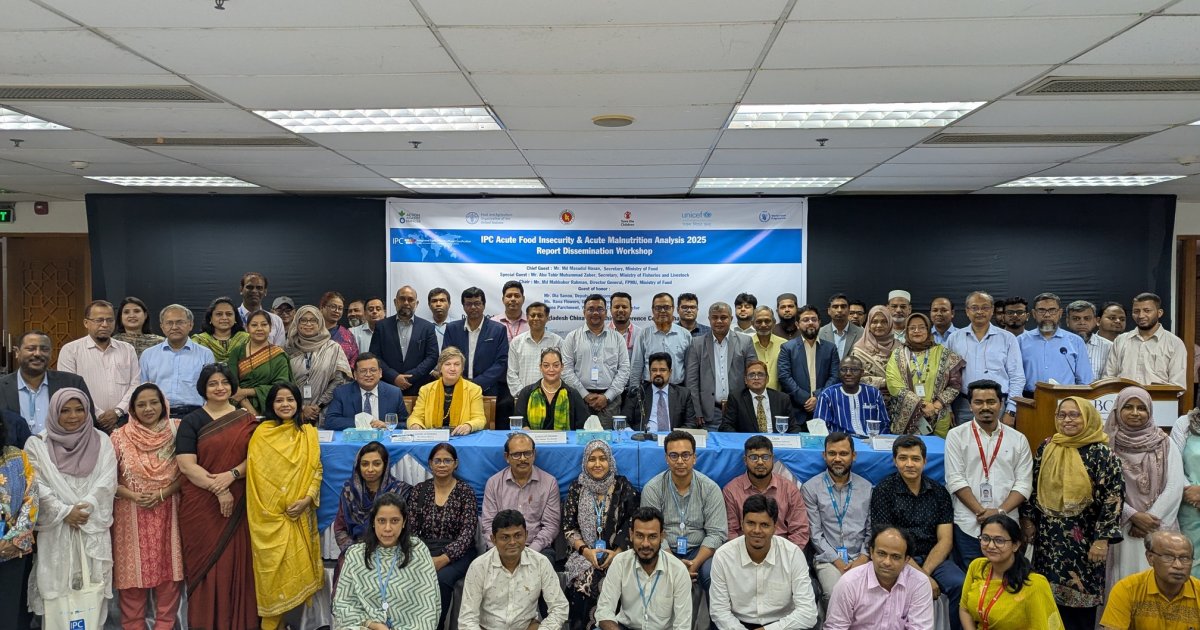Despite notable progress in food availability and policy alignment, Bangladesh continues to grapple with rising challenges in nutrition and food security, experts warned while presenting findings from the “IPC Acute Food and Nutrition Security Analysis (April–December 2025).”
The analysis, conducted under the Global Initiative on Integrated Food Security Phase Classification (IPC) framework, was shared during a national dissemination workshop held Sunday at Windy Town Hall, Bangladesh-China Friendship International Conference Center in Dhaka.
Jointly led by government agencies and the IPC Technical Working Group, the analysis revealed that while acute food insecurity remains moderate across most regions, emerging hotspots, particularly in northern and coastal areas, are facing heightened risks due to climate shocks, inflation, and lingering post-pandemic economic stress.
Md Masudul Hasan, secretary of the Ministry of Food and chief guest at the event, emphasized the urgency of multi-sectoral coordination and evidence-based policymaking.
“The IPC analysis is a vital tool for monitoring, planning, and building resilience in food systems. We must establish a robust food security monitoring system and translate IPC findings into actionable policies,” he said.
Special guest Abu Tahir Muhammad Zaber, secretary of the Ministry of Fisheries and Livestock, underscored the importance of fisheries and livestock in ensuring national food security.
He called for integrated, sustainable approaches to strengthen rural livelihoods and build resilience against climate and economic disruptions.
Unicef Representative Rana Flowers, attending as guest of honor, highlighted the critical role of nutrition in early childhood development and its long-term impact on human capital.
She urged targeted interventions to combat acute malnutrition among children and pregnant women, and advocated for stronger social protection systems to support vulnerable populations.
Md Mahbubur Rahman, director general of the Food Planning and Monitoring Unit (FPMU), stressed the importance of IPC analysis in guiding timely and effective interventions.
He called for enhanced collaboration among government bodies, development partners, and local administrations to ensure the successful implementation of food and nutrition programs.
Dr Shaikh Nazma Akter, director of the Institute of Public Health Nutrition (IPHN), noted that while stunting rates have declined, wasting remains a concern, especially in disaster-prone regions.
Experts reiterated that climate variability, inflation, and economic shocks continue to undermine household food access, and called for improved real-time data systems, early warning mechanisms, and nutrition-sensitive social protection strategies.
Representatives from FAO, WFP, and other international partners emphasized that the IPC framework must be treated as a strategic decision-making tool rather than a data exercise.
They urged the integration of IPC findings into national policies and budgets, and stressed the need to strengthen local-level monitoring and early warning systems to safeguard food security gains.
The workshop concluded with a unified call for government agencies, UN bodies, and development partners to act on IPC findings and ensure that vulnerable communities receive adequate, nutritious food.
Sumon Sengupta, country director of Save the Children in Bangladesh, delivered the welcome address, while Md Mahbubur Rahman formally closed the session.



